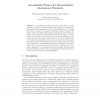Free Online Productivity Tools
i2Speak
i2Symbol
i2OCR
iTex2Img
iWeb2Print
iWeb2Shot
i2Type
iPdf2Split
iPdf2Merge
i2Bopomofo
i2Arabic
i2Style
i2Image
i2PDF
iLatex2Rtf
Sci2ools
IACR
2016
2016
Accountable Privacy for Decentralized Anonymous Payments
Decentralized ledger-based currencies such as Bitcoin provide a means to construct payment systems without requiring a trusted bank. Removing this trust assumption comes at the significant cost of transaction privacy. A number of academic works have sought to improve the privacy offered by ledger-based currencies using anonymous electronic cash (e-cash) techniques. Unfortunately, this strong degree of privacy creates new regulatory concerns, since the new private transactions cannot be subject to the same controls used to prevent individuals from conducting illegal transactions such as money laundering. We propose an initial approach to addressing this issue by adding privacy preserving policy-enforcement mechanisms that guarantee regulatory compliance, allow selective user tracing, and admit tracing of tainted coins (e.g., ransom payments). To accomplish this new functionality we also provide improved definitions for Zerocash and, of independent interest, an efficient construction ...
Biometrics | IACR 2016 |
| Added | 03 Apr 2016 |
| Updated | 03 Apr 2016 |
| Type | Journal |
| Year | 2016 |
| Where | IACR |
| Authors | Christina Garman, Matthew Green 0001, Ian Miers |
Comments (0)

